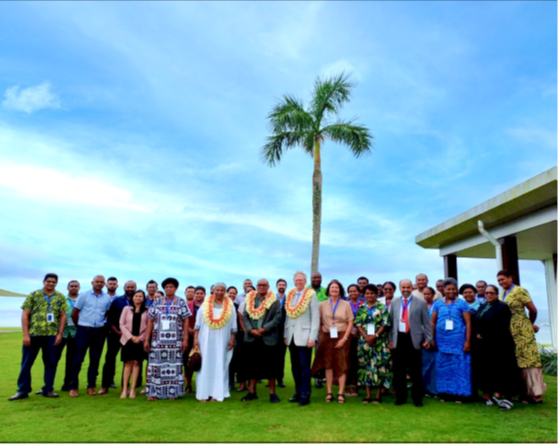Pacific Island nations, such as Fiji, have played a key role in global negotiations elevating the issue of climate-related loss and damage on the international agenda. Björn-Ola Linnér, Programme Director at Mistra Geopolitics and Professor at Linköping University, together with Malaika Mikaelsson, PhD student, took part in the Loss and Damage and the Climate Negotiations workshop in Fiji in October 2022.
Addressing Loss and Damage ahead of COP27
Extreme weather events, such as droughts, hurricanes and floods, are exacerbated by climate change. While international climate negotiations address mitigation and adaptation measures to reduce the impacts of climate change, extreme weather events impact local communities. Despite loss and damage becoming a pillar in the latest international climate negotiations as a form of financial compensation contributing to climate justice, there is still a gap in understanding perspectives and experiences at the local level.
Capturing Loss and Damage interpretations in the Pacific region
The University of Fiji held a two-day workshop titled Loss and Damage and the Climate Negotiations in collaboration with local and international partners, including the Ministry of iTaukei Affairs, Pacific Islands Development Forum, Linköping University, Mistra Geopolitics, and the Australian National University Institute for Climate, Energy & Disaster Solutions. The workshop provided a space to listen to different perspectives and discuss the issue of loss and damage, with the goal of strengthening collaborations and knowledge sharing.

Representatives from communities offered comprehensive, nuanced, sensitive and Pacific-relevant interpretations of loss and damage. Participants shared their experiences of relocation and discussed the practical ways in which loss and damage is currently being addressed. This provided the opportunity to share ideas, lessons learned and strategies being pursued to address loss and damage.
The organizers worked in collaboration with Honson Chan, a local artist, who created live illustrations as the speakers presented, capturing the daily realities of loss and damage. The panel discussions gained international media attention, and highlighted testimony from a resident of Narikoso, one of the 48 villages earmarked for relocation by the Fijian Government:
“Seawater comes right into the village grounds on a daily basis, and this destroys the foundation and walls of homes, but we will keep fighting, said Mr Saukitogato the Fiji Sun (Kelera Sovasiga, 15 October 2022).
Policy responses to climate change in Fiji
The Mistra Geopolitics research team had the opportunity to meet Fijian politicians to discuss climate change strategies and their views of the future. Given the preference of Fiji residents to stay on their land, it was seen as essential that global warming be limited to 1.5°C above pre-industrial levels by 2030 or 2050. However, the then-Prime Minister of Fiji, Mr Frank Bainimarama, expressed his pessimism about achieving this target, saying that there was insufficient commitment.
“When considering the strategies being implemented by Pacific states, Fiji is aiming to increase the amount of mangrove trees and to offer residents of Kiribati and Tuvalu the opportunity to relocate to Fiji”, said Malaika Mikaelsson, PhD student, Linköping University.
This article was written by Malaika Mikaelsson at Linköping University, and originally published in Mistra Geopolitics’ annual report 2022.
Featured: Malaika, Björn-Ola and Malaika Mikaelsson

Professor Björn-Ola Linnér




